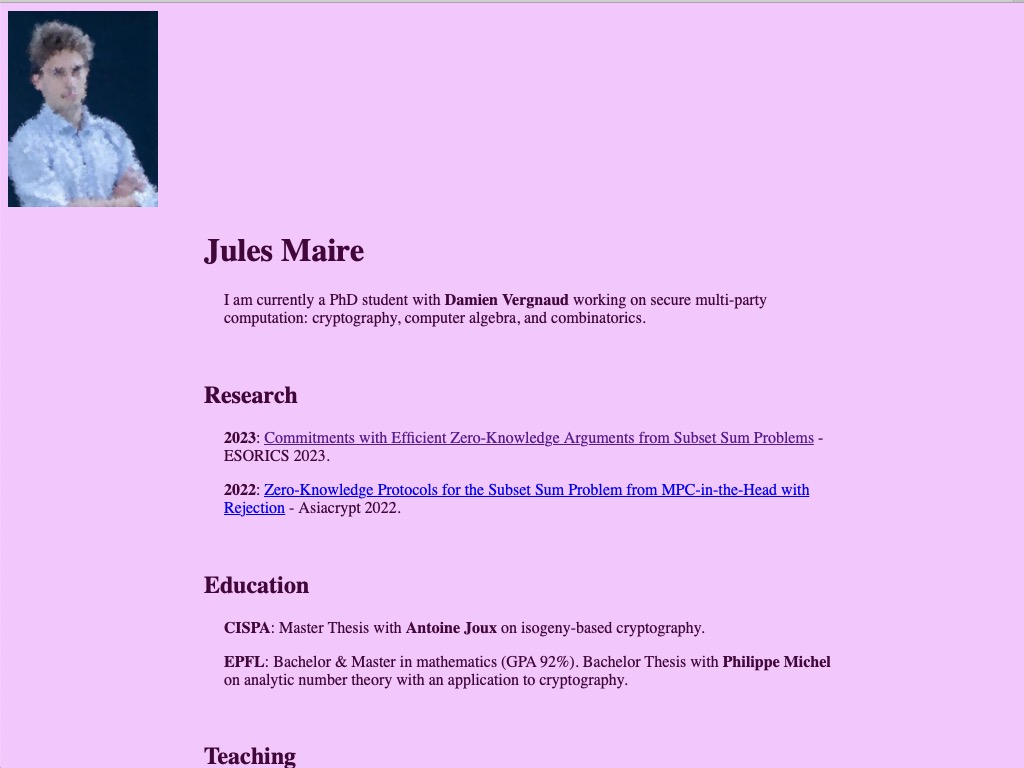MAIRE Jules
Post-doctorant à Sorbonne UniversitéÉquipe : ALMASTY
https://www-almasty.lip6.fr/~mairej
Direction de recherche : Damien VERGNAUD
Arguments à divulgation nulle de connaissance à l'aide de calcul multipartite sécurisé
Cette thèse a pour but d'étudier les arguments à divulgation nulle de connaissance, une primitive cryptographique qui permet de prouver un énoncé tout en ne révélant rien d'autre que sa vérité. Concrètement, nous nous concentrons sur une famille de preuves dont la construction est basée sur le calcul réparti sécurisé. Il est bien connu que, pour toute fonctionnalité f, il existe un protocole réparti sécurisé qui calcule f en sécurité passive. Etant donnée f de telle sorte que son inversion soit un problème dans NP, et en considérant un protocole réparti sécurisé réalisant f, il a été démontré que l'on peut construire un argument pour ce NP-problème. Ce résultat était apprécié seulement d'un point de vue théorique jusqu'à récemment, et notre travail contribue à l'émergence de nouvelles techniques ainsi que d'applications efficaces basées sur cette construction.
En guise d'amuse-bouche, nous développons des arguments qui améliorent de manière significative la complexité en communication de l'état de l'art pour certains problèmes bien connus.
Notre première contribution substantielle, avec un désir de partager de petits éléments sur de grands anneaux, est l'introduction d'un partage sur les entiers qui est intégré de manière sûre dans nos arguments grâce à du rejet artificiel.
Dans la lignée du partage introduit précédemment, nous proposons un schéma de mise en gage cryptographique basé sur des problèmes de sac-à-dos. Ce schéma permet un argument efficace pour la satisfiabilité de circuits.
Ensuite, nous présentons une construction d'arguments utilisant la conversion entre les partages de secrets additifs et multiplicatifs, permettant des arguments efficaces pour des relations linéaires et multiplicatives.
Enfin, laissant de côté la conception de protocoles, nous explorons les fondements de la cryptographie en étudiant les arguments à divulgation nulle de connaissance dans un contexte où plusieurs prouveurs partagent l'entrée secrète du protocole et veulent réaliser conjointement une preuve. Pour saisir tout l'intérêt de ce partage, nous ajoutons à la littérature un résultat pour les preuves à seuil à divulgation nulle de connaissance pour une relation NP générique.
Soutenance : 11/10/2024
Membres du jury :
Carsten Baum, Technical University of Denmark [Rapporteur]David Pointcheval, Ecole Normale Supérieure [Rapporteur]
Geoffroy Couteau, Institut de Recherche en Informatique Fondamentale
Jean-Marc Couveignes, Université de Bordeaux
Philippe Gaborit, Université de Limoges
Emmanuela Orsini, Bocconi University
Adeline Roux-Langlois, Université de Caen
Damien Vergnaud, Sorbonne Université
Date de départ : 31/10/2024
Publications 2022-2025
-
2025
- J. Maire, D. Vergnaud : “Compact zero-knowledge arguments for Blum integers”, Theoretical Computer Science, vol. 1038, pp. 115155, (Elsevier) (2025)
-
2024
- J. Maire : “Zero-Knowledge Arguments from Secure Multiparty Computation”, thèse, soutenance 11/10/2024, direction de recherche Vergnaud, Damien (2024)
- J. Maire, D. Vergnaud : “Secure Multi-Party Linear Algebra with Perfect Correctness”, IACR Communications in Cryptology, (International Association for Cryptologic Research (IACR)) (2024)
-
2023
- J. Maire, D. Vergnaud : “Efficient Zero-Knowledge Arguments and Digital Signatures via Sharing Conversion in the Head”, Computer Security - ESORICS 2023 - 28th European Symposium on Research in Computer Security, The Hague, Netherlands, September 25-29, 2023, Proceedings, The Hague, Netherlands, (Springer Nature) (2023)
- J. Maire, D. Vergnaud : “Commitments with Efficient Zero-Knowledge Arguments from Subset Sum Problems”, Computer Security - ESORICS 2023 - 28th European Symposium on Research in Computer Security,, Lecture Notes in Computer Science, The Hague, Netherlands, (Springer Nature) (2023)
-
2022
- Th. Feneuil, J. Maire, M. Rivain, D. Vergnaud : “Zero-Knowledge Protocols for the Subset Sum Problem from MPC-in-the-Head with Rejection”, Advances in Cryptology - Asiacrypt 2022, vol. 13792, Lecture Notes in Computer Science, Taipei, Taiwan, Province of China, pp. 371–402, (Springer) (2022)
